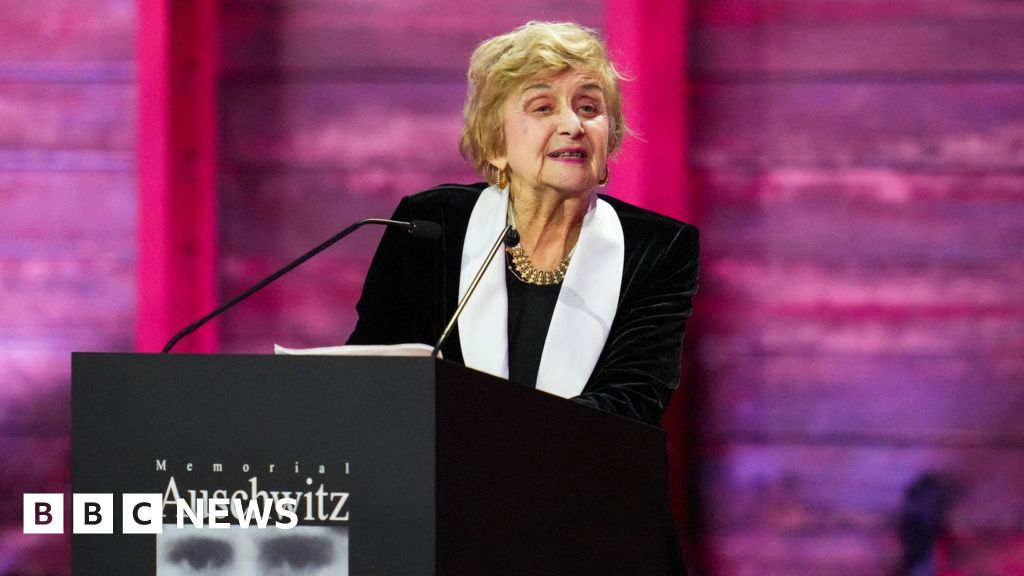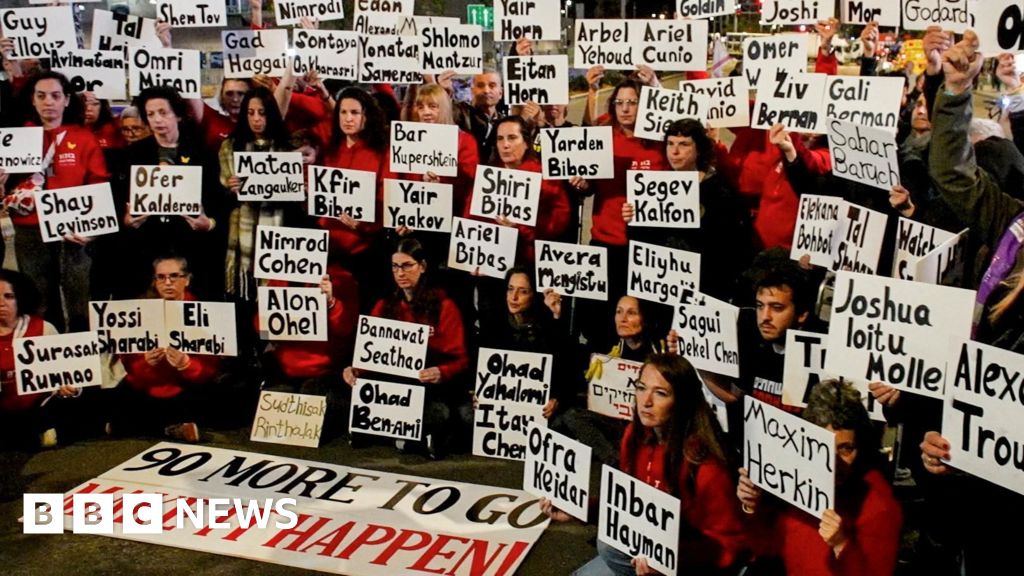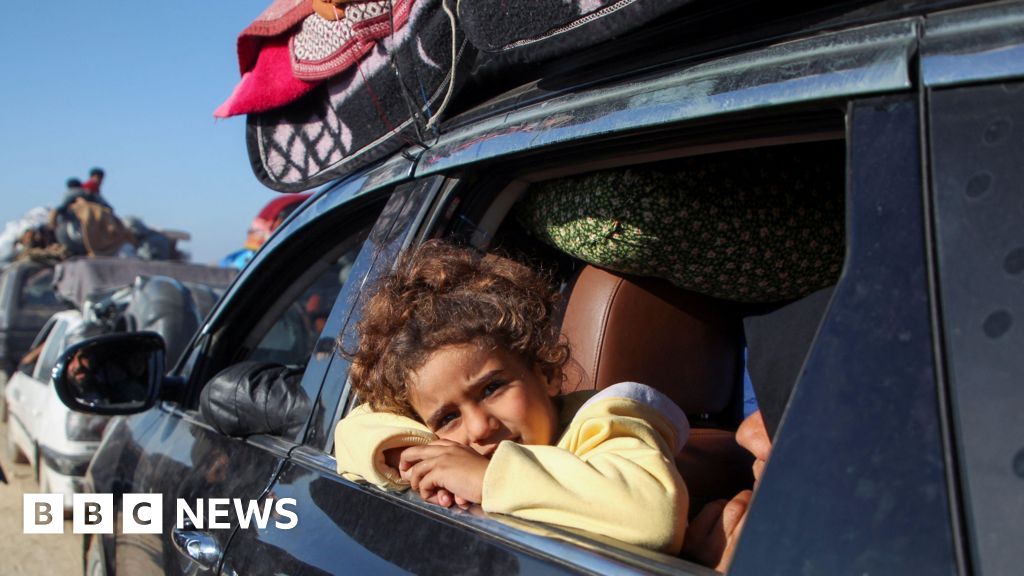ARTICLE AD BOX

Inbar Haiman, 27, Hersh Goldberg-Polin, 23, and Carmel Gat, 39, were all kidnapped on 7 October
By Natasha Preskey & Jamie Ryan
BBC News
"She doesn't deserve to wait for the next deal, just because she's not somebody's mother or grandmother," writes Or Neko Maymon on Facebook in Hebrew.
Or is talking about 27-year-old street artist and art student Inbar Haiman, who is his partner's sister.
Inbar was kidnapped by Hamas from the Supernova music festival in Israel on 7 October, and was seen days later in a hostage video circulated on social media, with blood on her face.
She is one of 16 women BBC Verify has identified as still being captive in Gaza, following a seven-day ceasefire between Israel and Hamas. This pause in fighting saw Hamas agree to release 110 hostages (including 78 women and children), in return for 240 Palestinian prisoners being freed from Israeli jails.
Israel's focus on securing the release of female hostages has raised and dashed hopes for the families of the women who are still left behind.
Since her kidnap, Inbar's friends and family have been campaigning for her release, and using the hashtag #FreePink, a reference to her street artist name.
"I'm really not ready for you to take away my hope to see Inbar come back," Or wrote in another post three days ago.
Image source, Portfolio Magazine
Image caption,Inbar Haiman is one of 16 women who are still being held captive in Gaza
In November, Inbar's boyfriend, 24-year-old Noam Alon, camped for 10 days in front of the central military headquarters in Tel Aviv, calling for the Israeli government to do more to secure Inbar's release.
Of the 237 people taken hostage by Hamas and five other armed Palestinian groups during the 7 October attacks, BBC News has verified that 115 are in Gaza. An Israeli government spokesman says 135 people remain captive. There is no official published list of hostages, so the BBC has had to confirm names itself.
Among the remaining hostages are at least 16 women and 95 men. This number includes French-Mexican Orión Hernández Radoux, the boyfriend of 22-year-old Shani Louk, who was killed after being kidnapped from the Supernova musical festival.
Soon after the festival was attacked, a video began circulating widely on social media showing the body of a young woman being paraded through the streets. Shani's family was able to identify her in the footage from her dreadlocks and distinctive tattoos.
Image source, Instagram
Image caption,Orión Hernández Radoux pictured with his girlfriend Shani Louk, who was killed in the 7 October attacks
At the end of October, Shani's mother Ricarda said she had been told by the Israeli military that a piece of skull bone belonging to her daughter had been found. Shani's body has not yet been recovered.
In November, her boyfriend Orión turned 31 in captivity.
"Today is Orión's birthday," wrote family friend Gabriel De la Fuente on Facebook in Spanish, "already a month since his kidnapping, may God return you well."
Orión is believed to have been snatched at the festival, and the Sun newspaper says it has seen threatening messages written in Arabic sent from his phone.
His friends and family join together in prayer each night at 7pm, in a WhatsApp group created to help them support each other.
"Only by uniting together in prayer will we provide the spiritual strength and support that your soul needs right now, wherever it may be," writes Gabriel.
Families waiting for loved ones to come home have become a great source of support to each other, says Gil Dickmann, whose cousin Carmel Gat has been captive since 7 October.
Carmel Gat was visiting her parents when she was taken
"We became like a real large family of families," he told the BBC News channel. "It feels as though, when their relatives are getting released, so are mine."
Carmel, a 39-year-old occupational therapist from Tel Aviv, had been visiting parents in Be'eri on 7 October.
Her sister in law, Yarden Roman-Gat, was released by Hamas on Wednesday, and reunited with her husband and three-year-old daughter.
"I wasn't even sure that she was alive until I saw her," Gil says of Yarden.
When the 36-year-old German-Israeli, her husband and daughter were captured, they managed to break out of the gunmen's car near the Gaza-Israel barrier, Gil explains.
The family then began to run away while being shot at. Realising she couldn't run fast enough, Yarden gave her daughter to her husband and surrendered so that they others could make their escape.
Image source, Maya Roman
Image caption,Yarden Roman-Gat initially escaped with husband Alon and daughter Gefen but went missing during the chase
"We were very, very happy to see her," says Gil.
But now the ceasefire is over, Gil grows more and more scared for his cousin Carmel, who has not yet come home.
"We were very, very worried by the fact that the truce is ended," Gil says. "I'm personally very worried for her."
Many people whose loved ones remain hostages in Gaza have been using social media to campaign for their release, share feelings and support each other in grief.
The mother of American hostage Hersh Goldberg-Polin has been posting videos of herself talking about her son on his family's Bring Hersh Home Facebook page.
"I wanted to share with you what happened last night when I woke up at 2:13 in the morning," Rachel told the Facebook page's 17,000 followers on Wednesday. "I started to think about how much pain Hersh must be in."
Hersh lost his dominant arm during a grenade explosion before being kidnapped
According to eye witnesses Rachel spoke with, Hersh lost half of his arm after a grenade explosion before he was kidnapped.
The 23-year-old from California was seen by witnesses being loaded onto a truck with others who were taken from the Supernova festival, his family told the Los Angeles Times. He was badly injured and unconscious, the witnesses said, and his last-known phone location showed him on the border with Gaza.
"It is really important that we get him home so that he can start the process of learning how to live his life in a very different way than he ever lived it before," says Rachel in one of her latest videos.
"It's just another reason why we are tenaciously and tirelessly fighting for him to come home."

 1 year ago
19
1 year ago
19








 English (US) ·
English (US) ·